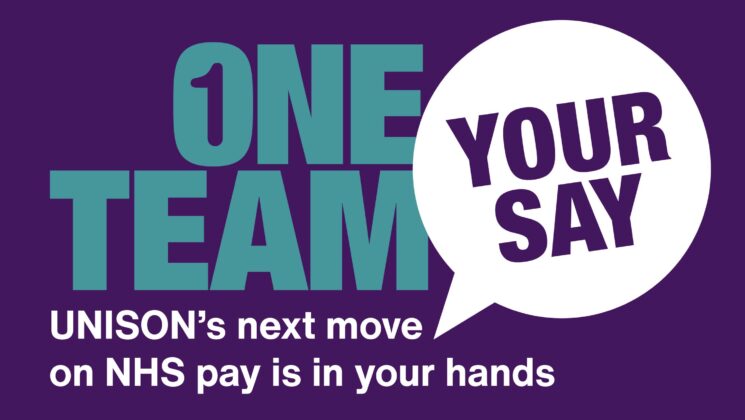The government has failed to honour its own ‘levelling up’ promises with the disappointing 3% pay rise for NHS workers in England, says UNISON.
The award announced last week doesn’t meet the real living wage of £9.50 per hour for the lowest paid health service workers and widens the gap between those at the top and bottom of the scale, the union says.
The 3% increase means the lowest earners will get a rise which is just one sixth of those at the top of the NHS pay scales.
UNISON will begin consulting NHS workers later this week on whether they accept the rise, or oppose it and are prepared to take industrial action.
More than 300,000 people across all disciplines – including nursing, ambulance, operational and technical services – will be asked for their views from this Friday until 10 September. UNISON says its elected leadership body is giving a clear steer that 3% is “unacceptable”.
In 2018, the government and then health secretary Jeremy Hunt made great play of raising the minimum NHS salary to the level of the real living wage for the first time. But ministers failed to embed this for the future and the lowest salaries slipped below, says UNISON.
Last week’s pay announcement means the NHS has failed to regain its position alongside the UK’s 8,000 living wage employers. The fact that the rate falls just 1.5p per hour short is an oversight that demonstrates how little attention the government has given to the lowest paid, says UNISON.
UNISON had called for an across-the-board £2,000 pay increase for all NHS staff. This would have ensured the pay gap and inequalities would not have widened further.
The only staff who do get a £2,000 rise with this award are those already earning more than £70,000 annually, UNISON says.
UNISON head of health Sara Gorton said: “All health staff deserve equal recognition for their contribution to the NHS and their efforts during the pandemic. But the pay review body’s 3% recommendation means thousands still won’t be on the real living wage.
“Missing the living wage target by 1.5p per hour shows the government ignored the lowest paid, for all the Prime Minister’s talk of levelling up.
“It’s vital staff give their views straight away. Ministers won’t wait to hear what health workers think before they begin paying the new rates.
“With this pay review process, it isn’t enough just to register disapproval. If staff want to challenge this outcome, they need to take part in this consultation and show there’s widespread support for industrial action.”
Notes to editors:
– UNISON had called for a £2,000 increase to all pay points which would have rewarded all NHS staff equally. The 3% rise delivers the following cash increases over the year to the tops of the various pay bands:
- Lowest point: £540
- Top Band 2 £580
- Top Band 3 £634
- Top Band 4 £725
- Top Band 5 £918
- Top Band 6 £1,137
- Top Band 7 £1,335
- Top Band 8a £1,550
- Top Band 8b £1,860
- Top Band 8c £2,210
- Top Band 8d £2,633
- Top Band 9 £3,148
– The consultation will give members the choice of accepting the outcome or opposing it by taking part in lawful industrial action. It will be sent to all NHS members working in England on Agenda for Change pay scales
– Members in Northern Ireland and Wales will be consulted when ministers determine the outcome and timetables affecting their NHS workers.
– In Scotland, UNISON recommended a negotiated settlement which delivered 4% to staff in the middle of the pay scale, with staff at the lower end receiving a flat cash increase of £1009, payable back to 1 December 2020. Increases for the highest paid were tapered between 0.75% and 2%. The Scottish government has a long-standing policy of embedding the real living wage.
– UNISON is the UK’s largest union, with more than 1.3 million members providing public services – in the NHS, local government, education, police service and energy. They are employed in both the public and private sectors.
Media contacts:
Anthony Barnes M: 07834 864794 E: a.barnes@unison.co.uk
Fatima Ayad M: 07508 080383 E: f.ayad@unison.co.uk

